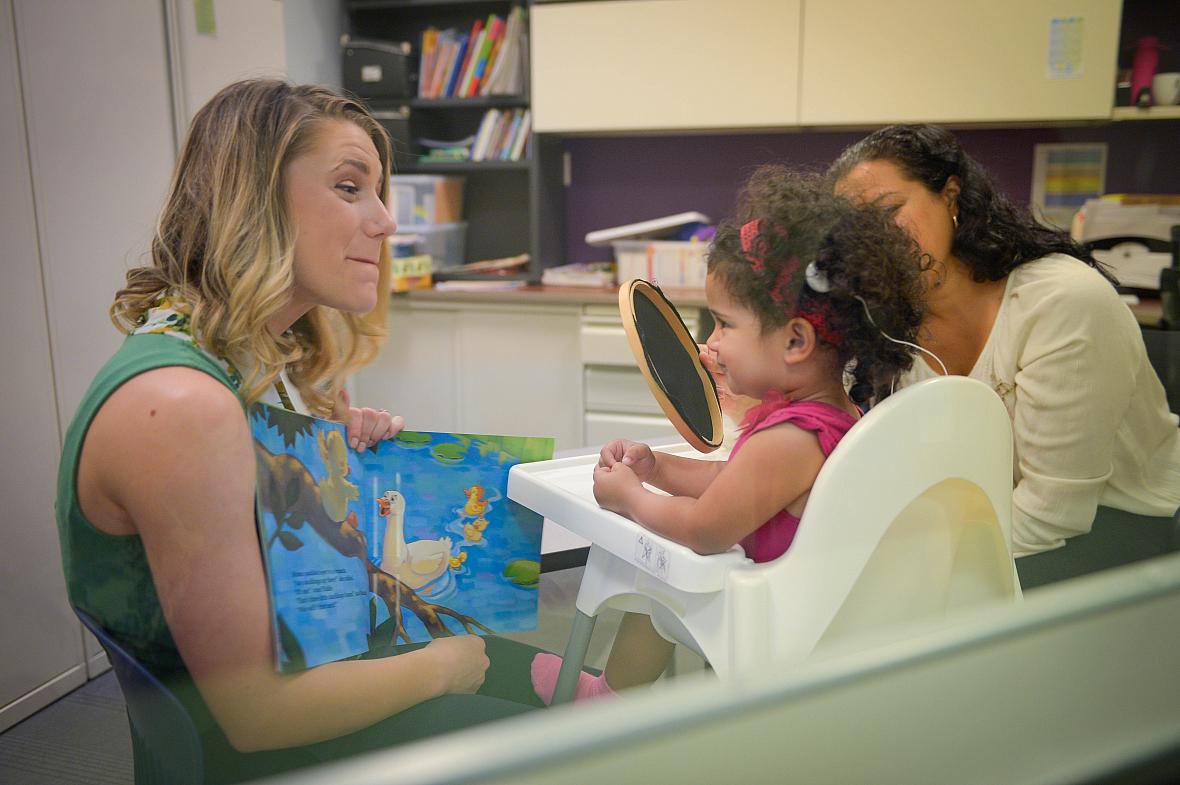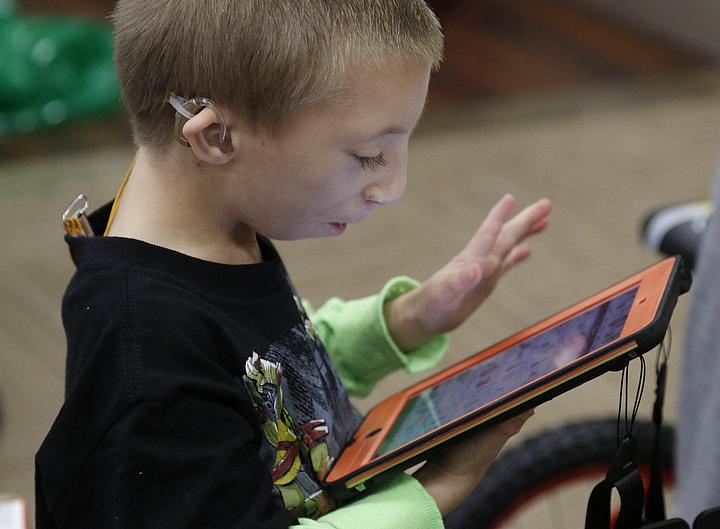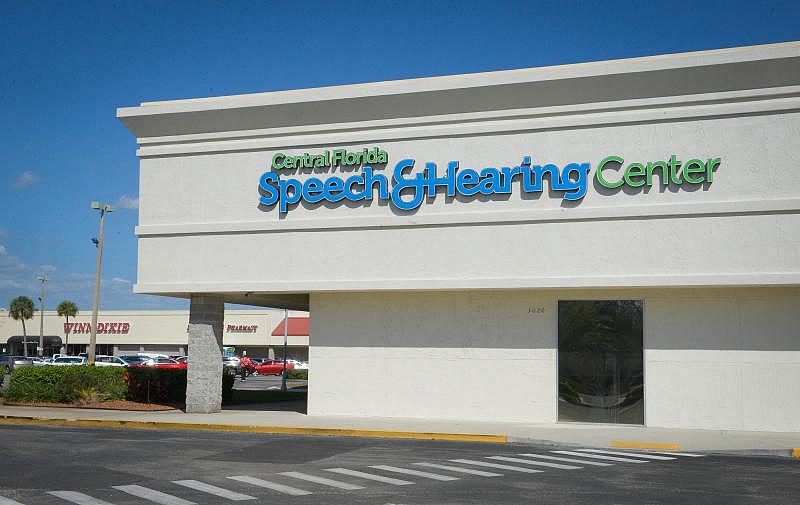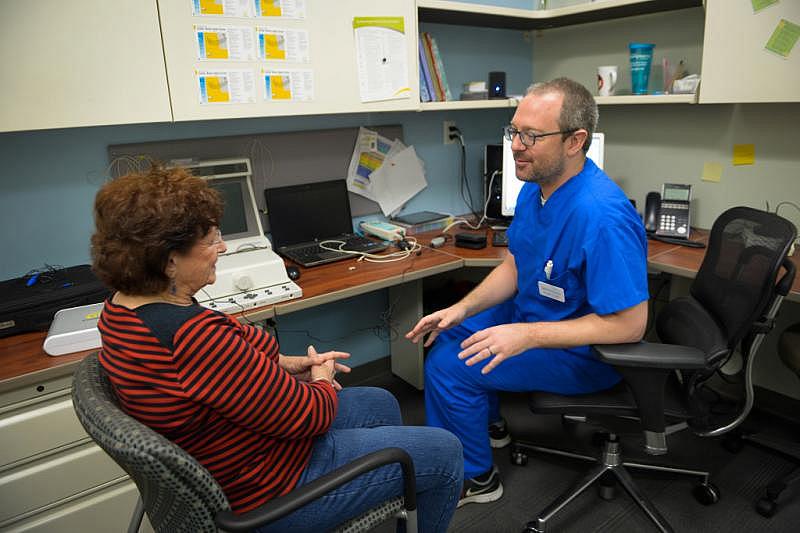Sound at stake: Kids at Florida hearing clinic caught in broken Medicaid system
Maggie Clark reported this story with the support of the Dennis A. Hunt Fund for Health Journalism and the National Health Journalism Fellowship, programs of USC Annenberg’s Center for Health Journalism.
Other stories in the series include:
Medicaid in Florida: 2 million kids. $24 billion battle.
An impossible choice: Doctors torn between patients and Florida's Medicaid system
Fighting for care in Florida's Medicaid system
2 Million Kids' series spurs support and quest for more data

Angelina Anastasio, 2, works with speech therapist Kristen Garcia as her mother, Melanie Anastasio, looks on at the Central Florida Speech & Hearing Center in Lakeland, Fla. STAFF PHOTO/RACHEL S. O'HARA
LAKELAND — Every Monday afternoon at about 5 p.m., Dottie Payton brings her nephew Christopher Rollins to his weekly speech therapy appointment at the Central Florida Speech and Hearing Center. They know the routine: Christopher bounds through the front door and takes a hard right into the TV room, scrambling to the top of the three-level cushion seating. The 10-year-old sits mesmerized by the movie playing — today it’s Cinderella — and waits patiently for his therapist.
Payton sits patiently too, resting after the hour-long drive from Frostproof and a long day of serving lunch to students at Fort Meade High School.
Two years ago, when they started coming to therapy sessions at the center, Christopher was a different kid. Payton had recently taken over full-time care of her nephew after his family was in a car accident and doctors found him covered in ant bites, wearing diapers at 7 years old and not enrolled in school.
Christopher, who was born underweight with numerous physical problems, including hearing loss and a cleft palate, couldn’t speak and couldn’t understand language, with his head seemingly stuck in a downcast position.
In the countless appointments Payton set for Christopher, she managed to get him in at the Central Florida Speech and Hearing Center, the closest office to their home that would accept his Medicaid insurance.
Christopher Rollins, seen here at age 9, navigates the app “ProLoquo2go” on his new iPad Mini in the conference room at the Central Florida Speech and Hearing Center in Lakeland Fla., on December 22th 2014. THE LEDGER/CALVIN KNIGHT
About half of all Florida children — more than 2 million — are enrolled in Medicaid coverage, and the system struggles to connect those children with adequate healthcare.
A Herald-Tribune series published this year detailed the problems in the system, where about half of enrolled children do not receive the regular checkups they’re owed, and barely one-third get dental care.
A 10-year lawsuit involving pediatricians, parents and the state Medicaid program recently was settled and the state agreed to begin correcting some of the problems.
For now, however, getting access to specialists, such as the speech therapists and audiologists at the Central Florida Speech and Hearing Center, is even tougher than getting regular checkups.
The center is one of a few Lakeland offices even screening new Medicaid patients, and it has a speech therapy appointment waiting list for of more than 100 child Medicaid patients.
The finances of a broken Medicaid system forced the center to make the difficult decision to create a separate Medicaid waiting list.
The facility loses $33 for every speech therapy session, about half of what it would make if a child had private coverage or paid cash. For audiology services, the loss comes in at $94.27.
There’s no fee increase in sight from the state — a recent plan to raise reimbursement rates to Medicaid providers was limited to pediatricians, obstetricians and gynecologists, and excluded specialists such as the therapists working at the center.
To make up for those losses, the center has turned to revenue-generating options, including year-round fundraising and selling hearing aids, but so far, results have fallen short of the goals.
The children who can get regular therapy appointments get access to weekly one-on-one sessions where they may be able to overcome the early language gaps that can set kids up for trouble with school readiness or reading on grade-level. But the ones who can’t get an appointment often have to travel to Tampa or Orlando for services, or go without.
The consequences can be devastating. Only 40 percent of Florida students who are deaf or hard of hearing graduated with a standard diploma in 2014, according to the Florida Department of Education.
Fewer than half of adults with a hearing disability were employed in 2012, and adults with hearing disabilities earned $1,400 less per year on average than adults without a disability, according to the 2015 annual report from the Florida Coordinating Council for the Dead and Hard of Hearing.
The Medicaid-enrolled children on the center’s waiting list don’t have any other local options for therapy, said the center’s president and CEO, Roxann Bonta.
“They’re just out there,” Bonta said. “The parents get angry and they take it out on us, and we understand why. But it is very hurtful, particularly when the therapists have known these children and families for years. They’re just in limbo.”
The transformation of the center from a payer-blind treatment center into a more business-conscious operation has been hard for many long time staff to absorb. But the alternative — closing to all patients — is unthinkable.
“If we can’t meet the margin and keep our doors open, we can’t meet the mission of providing services to children and adults, and then they’ll have nowhere in Lakeland to go,” said Gay Ratcliff, a board member and the center’s former chief executive officer.
***
This Tuesday morning appointment was not Mercedez Stallsmith’s first time at the Central Florida Speech and Hearing Center. The fifth-grader has been having trouble hearing for years, ever since she developed a benign cyst that affects her cochlea, the organ the body uses to hear. Today, she’s seeing an audiologist, Dr. Ben Russell, who runs a battery of tests to see how he can help.
From the other side of a soundproof booth, Russell plays a recording of words and asks Mercedez to repeat them: kids, talk, rain, germ. When they get to “team,” Mercedez struggles. She couldn’t hear that one.
Her mom, Selina Holt, sits anxiously in the corner of the booth. She just wants to know why her child can’t hear.
“It’s frustrating,” she tells Russell, “because she works so hard.”
Once the test is complete, Russell sees that Mercedez meets Medicaid’s criteria for hearing loss, so she can get a hearing aid.
It’s a threshold not all children meet — Medicaid only covers hearing aids when a child has moderate hearing loss, meaning they can’t hear conversational speech, a baby crying or have trouble making out J, G, Z, I and 11 other letter sounds. Even more commonly, audiologists aren’t willing to see Medicaid-enrolled children because of the nearly $100 loss they’ll incur for the appointment, so the hearing loss goes untreated.
Holt sets up another appointment for Mercedez’s hearing aid fitting. She doesn’t want her missing any more school.
***
Anchoring the end of a South Lakeland shopping plaza on Lakeland Highlands Road, the first thing that strikes visitors is the center’s openness. The location is new for the nonprofit, which for decades was on the north end of town, near the health department and other low-income health centers. Ratcliff remembers that at the old center, they practiced what she called “double-decker therapy,” where the staff would do therapy sessions anywhere they could find an open spot, sometimes on top of one another.
The new center is bright, large and visibly expensive.
Financed by a one-time donation from a donor, Reva McClurg, who is deceased, the center’s high-end looks are a blessing and a curse, Bonta said.
“We look good, so people think we’re fine” financially, Bonta said. “But at the same time, how can we ask our kids to aspire to better if we don’t show them better? We want them to know that they deserve a nice place to come each week, where they’re greeted by name and with a smile.”
Children and adults come from all over Central Florida for weekly speech therapy and hearing testing.

Patients from Polk, Hardee, Highlands and Pasco counties, and occasionally as far away as west Hillsborough, drive for individual 30-minute or hour-long sessions with a speech therapist or doctor of audiology.
The cozy setting is slightly different than what’s available for Medicaid-enrolled children in Southwest Florida, which relies on the more medical All Children’s Hospital outpatient clinic in Sarasota for speech therapy and audiology.
And in Lakeland, there are fewer privately insured patients to offset the loss the center takes for treating Medicaid patients.
Of the 140 kids the center sees each week, 123 have Medicaid insurance.
In addition to providing a nice place for patients, the new center is part of the organization’s strategy to raise its profile with privately insured patients.
The center recently opened a hearing-aid boutique of sorts, where patients, typically seniors, are fitted for hearing aids and can try them out in a living room-type environment with a TV, phone and other distractions so they can get a feel for what their hearing aid will be like at home.
Even if just 20 percent of the center’s speech therapy patients were privately insured or paid cash, their fees would offset the loss of the other 80 percent of patients who use Medicaid to cover their therapy, Bonta said.
But meeting that 20 percent bar has proved challenging. The center is struggling to shake its reputation as a service center for poor people.
“Most people see us as a Medicaid center for low-income people, if they know of us at all,” Bonta said. “We’re a nice facility, and I try to tell people that it shouldn’t look worse or have a lesser quality of staff just because we serve Medicaid patients.”
***

Dr. Russell heads down the hallway to the lobby to get his next patient, Gail Smith, a 78-year old Lakeland resident. Smith has struggled with hearing loss her whole life and five years ago got a cochlear implant, a medical device that does the work of the inner ear to send sound signals to the brain. She’s one of the insured adults who help offset the cost of caring for Medicaid-enrolled children.
Smith is a pro with her hearing devices. She carries her hearing supplies in a makeup bag with compartments for extra batteries and cleaning wipes.
Adjusting to the implant hasn’t been easy — high pitch language sounds hurt, likely because she’s never heard them before.
“It’ll give me a headache if it’s too loud,” Smith tells Russell, while he adjusts the implant levels to make it more comfortable.
They go back and forth trying to reassure each other that they’re trying their best.
“It’s not a magic thing,” Russell tells Smith.
“It seems to be OK. It’s loud but I have to get used to it — this ear hasn’t heard in a long time. It’s a miracle, it really is.”
***
Founded in 1960 by the women of the Junior League of Lakeland, the Central Florida Speech and Hearing Center was established as a nonprofit center offering payment-blind services. For more than 40 years, the center operated in a city-owned building on East Bella Vista Street in North Lakeland, and though more space was added over time, the continuous demand for services had the 6,500-square-foot building bursting at the seams.
At the same time, the center was grappling with changes to the state’s Medicaid system as new managed care companies created tighter administrative requirements for reimbursement. Medicaid recently cut every reimbursement to the center by $1, which costs them about $500 per month in lost revenue.
By the time the Great Recession hit in 2008, the balance between the head — the business — and the heart — the mission, said board member and former interim CEO Larry Stahl, had gotten out of whack. The center was in danger of closing.
The problems with Medicaid are not new. Ratcliff said she can’t remember a time when the center did not have a wait list. But a recent decision to create a separate waiting list for Medicaid patients was a hard one, said Ratcliff, now a board member.
“That was a difficult thing for all of us to do, morally, to separate the wait list between Medicaid and private pay,” Ratcliff said. “But if we couldn’t keep the doors open, we couldn’t meet our mission of providing services to children and adults.”
New patients referred by their pediatricians for a speech and hearing evaluation can get one right away, but there’s no room for more regular therapy patients. And for a young child just 3 or 4 years old, even a few months is a huge window for brain development.
They face a struggle familiar to all pediatric providers trying to balance running a medical business and serving Medicaid-enrolled kids who need help: care for all and go out of business, or care for some and turn others away.
***
At the end of the speech wing hallway, therapist Kristen Garcia reads a book to Angelina Anastasio, 2, who has cochlear implants in both ears. Her mom, Melanie Anastasio, holds her and occasionally signs a few words to the toddler, in an effort to pair sounds with sign language.
“Orange” Garcia prompts, her face close to Angelina’s so the toddler can see the shape her mouth makes when she speaks the word.
“Or-hanne,” Angelina replies. “Very good — her ‘orange’ sounds really good,” Garcia says to Melanie.
Angelina is the center’s ‘child of the year’ this year, for her exceptional progress and her family’s commitment to her success. But unlike other children of the year in the past, including Christopher Rollins, Angelina’s family has private insurance.
This was a conscious choice, Bonta said, because the center wants to demonstrate to the community that it is generating revenue and isn’t only asking for donations.
Anastasio is grateful for the center’s commitment to Angelina and the therapists’ willingness to teach sign language in addition to speech therapy. Not all hearing centers offer both services, and she is grateful that the center supports her family’s desire to embrace sign language.
***
To keep serving the community for the next generation, the center’s leaders are focused on revenue-generating services to bring in money to offset Medicaid losses.
The center already provides hearing testing to manufacturing businesses that have to meet federal workplace safety regulations, driving to businesses in Florida and South Georgia to do tests in a specially-equipped van. They’ve also secured contracts with local public charter schools to provide speech therapy for their students.
They are putting more resources into developing their hearing aid program to attract older adults with Medicare and private insurance. And they’re giving presentations to business and civic groups across Central Florida to raise the profile of the center as a place for all people — not just Medicaid patients — to get help with speech and hearing.
By pursuing revenue-generating projects, the center’s board and the development team are hopeful that donors will see that the center is making an effort to support itself before asking for money. They hope that by sticking to this route, they’ll eventually generate enough revenue to hire more staff and get children off the Medicaid waiting list and into therapy.
“We are not close to closing,” Stahl said. “We have some years left, but what we’ve recognized is that if the head and heart skills get out of balance, we will be worrying about survivability. We are a necessity, and if we’re going to care for our community and make sure children are able to learn and adults are able to work, our center has to be here.”
[This story was originally published by The Herald-Tribune.]
Photographs by Rachel S. O'Hara/The Herald-Tribune.

